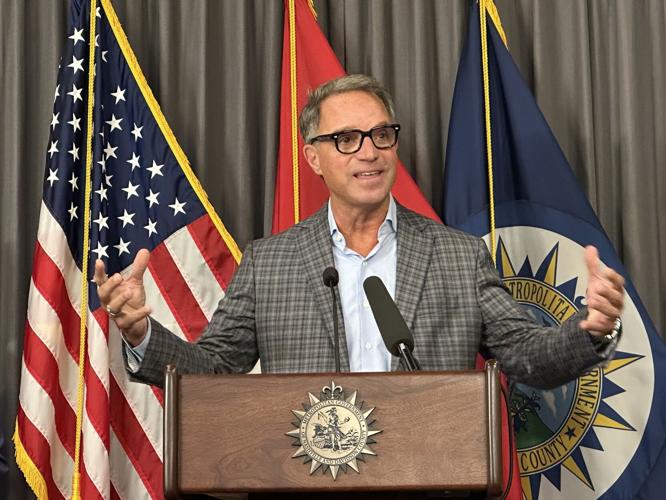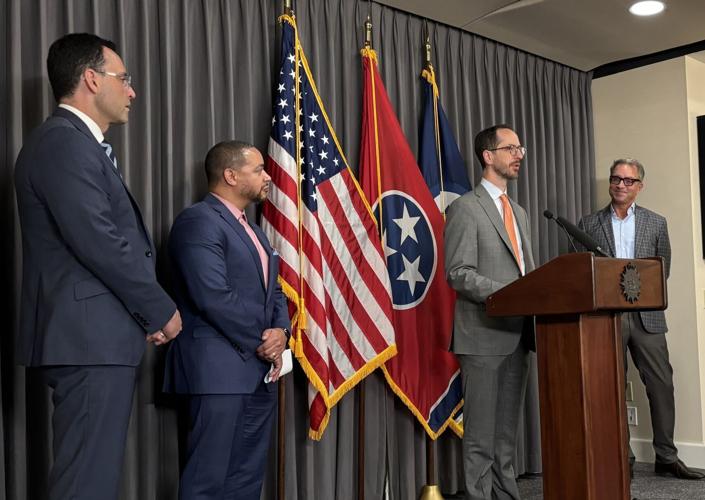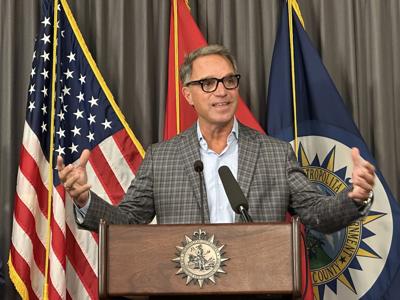After revealing the results of a study of more than 10,000 Nashvillians in February, the Imagine Nashville team took seven months to engage residents and experts in creating more than 30 ideas for action. Imagine Nashville co-chairs Dr. Alex Jahangir and John Faison Sr. joined Mayor Freddie O'Connell for his Friday media roundtable to unveil the group's recommendations.
"We wanted to create a unified vision for the next decade driven by shared values of Nashvillians and providing a road map for policymakers, nonprofit leaders, philanthropists, business, community and neighborhood groups alike," Jahangir said. "As we stand before you today, I'm really proud to say I think we've reached our goal."
"It was reassuring to discover that their data deep-dive reinforced what we had heard from voters across the city all year," O'Connell said. "Keeping our transition process and the Imagine Nashville process linked was an important decision for us. After a campaign built on making it easier for Nashvillians to stay and thrive here, we worked through the first year of this administration to improve quality of life and make Nashville more affordable."
The four areas of focus laid out Friday morning included creating pathways for a higher standard of living, moving people around the city safely and efficiently, matching the demand for attainable and affordable housing, and fostering a high quality of life and distinct character for each neighborhood.
Nashvillians respond to questions about politics, East Bank, fairgrounds, transit referendum
“From young people to aging Nashvillians, immigrants to LGBTQ residents, these are the voices that make Nashville what it is, yet many feel like they’re on the outside looking in,” Imagine Nashville co-chair Renata Soto, who was unable to join the meeting, said in a release. “We were intentional about including all these groups in shaping our vision for the future. We want Nashville to be a place where everyone can see themselves.”
The research showed the sense of belonging that 78 percent of Nashvillians feel is also at risk, with 72 percent of respondents seeing a growing divide between the rich and poor and 57 percent of low-income families feeling increasingly excluded from the opportunities of living in the city. In the meeting Friday, Faison recognized this as well as the need for management of growth.
"The bottom line is we've got to focus not just on growing, but also on making sure people are thriving," Faison said. "We also feel a sense of duty to the thousands of Nashvillians who rolled up their sleeves and helped us imagine what Nashville could be. We owe it to them to ensure that these ideas are implemented with faithfulness and with fidelity."
As part of the announcement, Community Foundation of Middle Tennessee CEO Hal Cato joined the group to share that the foundation would be forming implementation teams for each of the four recommendations. He said the Community Foundation will work directly with the mayor's office, including senior director of civic and community engagement Brittany Irby, on these initiatives.

From left: Imagine Nashville co-chairs Dr. Alex Jahangir and John Faison Sr. with Mayor Freddie O'Connell and Community Foundation of Middle Tennessee CEO Hal Cato
"Our goal here is to really create world-class, public, nonprofit, philanthropic partnerships that advance each priority," Cato said. "Each team will be led by leaders from the public and nonprofit sector and charged with developing a multiyear scope of work that aligns to clear, actionable and measurable strategies that will be supported by implementation team coordinators."
He said the question of how to know whether they are really able to move the needle was an ongoing challenge that came up during the process. To address that, the Community Foundation is forming a partnership with the Belmont Innovation Lab for Social Impact to create a community indicators platform that uses artificial intelligence and combines data points from the Imagine Nashville study and other relevant data.
"I feel very hopeful that it will give our community the potential to weave together both the anecdotal and the empirical data that we need to know where progress is truly happening and what's behind it," Cato said.
He noted that other studies have taken place in the past five to 10 years, and that this kind of data repository can help identify where the city is in relation to those findings and be a source for future progress markers. Cato said a group of data scientists from Belmont and Vanderbilt universities are working on developing an active demo that they hope to have ready by the end of the month.
This article was first published by our sister publication, the Nashville Post.








